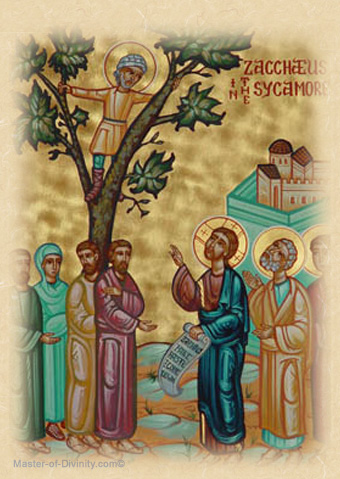Sometimes it's the little things that matter most.Luke 19:1-10. The Thirty-Seventh Sunday after Pentecost. The Sunday before the Triodion, known as the Sunday of Zacchaeus.
Return to ByzantineCatholicPriest.com. |
 12:35 PM 2/6/2011 — The encounter between our Lord and Zaccaeus is painted very vividly by St. Luke: Jesus is passing by, and a large number of people have lined the streets to catch a glimpse of him. Zaccaeus would like to get a look at Jesus, too; but he’s at the back of the crowd and can’t see anything because, as the Gospel says, he was a relatively short man. So, to get a better look at Jesus, he climbs up a sycamore tree. But climbing up a tree not only allows him to see Jesus, it allows Jesus to see him. Why our Lord singles him out will always be a mystery—I like to think that Jesus saw both an opportunity to save a soul as well as make a point. He is, after all, God, and certainly could know, simply by looking at Zaccaeus, exactly what kind of man he was. He also knows that, by inviting himself to Zaccaeus’ house, he’s going to be raising some eyebrows. St. Luke tells us how they all murmured when they saw the two go off together, and whispered to themselves, “He’s gone to a sinners house as a guest.” 12:35 PM 2/6/2011 — The encounter between our Lord and Zaccaeus is painted very vividly by St. Luke: Jesus is passing by, and a large number of people have lined the streets to catch a glimpse of him. Zaccaeus would like to get a look at Jesus, too; but he’s at the back of the crowd and can’t see anything because, as the Gospel says, he was a relatively short man. So, to get a better look at Jesus, he climbs up a sycamore tree. But climbing up a tree not only allows him to see Jesus, it allows Jesus to see him. Why our Lord singles him out will always be a mystery—I like to think that Jesus saw both an opportunity to save a soul as well as make a point. He is, after all, God, and certainly could know, simply by looking at Zaccaeus, exactly what kind of man he was. He also knows that, by inviting himself to Zaccaeus’ house, he’s going to be raising some eyebrows. St. Luke tells us how they all murmured when they saw the two go off together, and whispered to themselves, “He’s gone to a sinners house as a guest.”
Our Lord does not respond to them on this occasion. Later on, when a similar situation presented itself, and our Lord was actually seen dining in the house of a public sinner, he would utter those famous words that would forever be a motto for his ministry: “It is the sick who need the physician, not the healthy.” But on this occasion he doesn’t say anything; he just goes with Zaccaeus to his house; and his kindness to Zaccaeus was enough to motivate Zaccaeus to completely change his life. In fact, not only does Zaccaeus change his thieving ways then and there, he also promises our Lord that he’ll pay back everything he’s stolen four times over, and give half of what's left to the poor. Now, that’s bound to make a dent in his standard of living. Zaccaeus made himself rich by skimming off the top of the tax money he had collected for the Romans. If he pays it back multiplied by four, he’s going end up a poor man. But, apparently, that’s O.K. with Zaccaeus. The kindness that our Lord showed him by simply acknowledging him as a human being, and going to visit with him in his home regardless of how much it scandalized the self-righteous, meant more to Zaccaeus than anything else he had.
It’s very easy to hate evil people, especially if we are among their victims. The people in Jerico hated Zaccaeus because he collected more in taxes than he was authorized, and pocketed the difference for himself; but it wasn’t their hatred of him that moved him to give them their money back with interest; it was an act of kindness performed by a stranger he had never met before. Now, admittedly, that stranger happened to be God, and enjoyed a certain degree of intuition that the good populace of Jerico didn’t have. Nevertheless, you don’t have to be God to be kind to people, especially to people whom it may be very popular to hate.
Jesus didn’t do all that much for Zaccaeus comparatively speaking: he didn’t give him back his sight, or make him walk when he was crippled, or bring his dead daughter back to life;—things that he had done for others—all he did for Zaccaeus was have a cup of coffee with him in his house. To us, it doesn’t seem like much;—it may not have seemed like much to our Lord—but, to Zaccaeus, it meant everything. It just goes to show that you never can tell how much good you can do by doing the simplest things.
Next Sunday begins the Triodion: that four week period that prepares us for the rigors of the Great Fast. With all that we have to worry about day after day, the little things often escape our attention. As we begin to prepare ourselves for Lent, perhaps it would be to our advantage to think, now and again, of all those little things that can come between ourselves and Christ.
Father Michael Venditti
|
�
